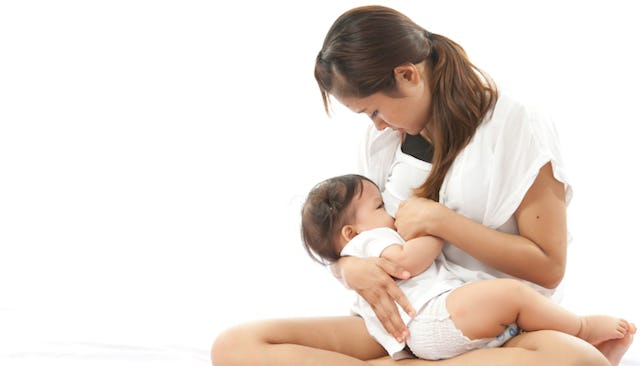Increasing Evidence Proves Breast Isn't Always 'Best'

Whether you breastfeed or formula feed, there’s one mantra that’s repeated over and over again: breast is best. You whisper it to yourself in the dark as the pain of those first latches washes over you, you repeat it to newly pregnant friends, and — if you use formula — you insert it into conversations as a buffer to ward off judgment from strangers. “I know breast is best,” you utter mechanically, “but these are the myriad excuses why it wasn’t right for me.”
Well, as it turns out, breastfeeding is hardly the best.
In a recent Op-Ed in the New York Times, Courtney Jung discusses new evidence that shows we’ve vastly overstated the benefits of breastfeeding, and it’s having a detrimental effect on moms. Like most new moms, Jung was bombarded with information about breastfeeding as soon as she went public with her pregnancy. Well-meaning friends offered advice and strangers inquired as to how she’d feed her baby. Her birthing class even refused to do lessons on formula feeding because it’s “against hospital regulations.”
Anyone who’s had a baby in the past decade can relate all too well to what Jung describes. Over 14 percent of all U.S. births now occur in baby-friendly hospitals, where breastfeeding is heavily promoted. According to Jung’s essay, 79 percent of American mothers initiate breastfeeding and 49 percent of them are still breastfeeding at six months. We are a nation of breastfeeders, and that is due mostly to the overwhelming “evidence” showing how awesome breastmilk is.
Breastmilk has been credited with everything from fighting disease to making kids smarter, but it’s only recently that we’ve dug into these claims. New studies show breastfeeding doesn’t actually make kids much smarter, and research in Jung’s own essay confirms breastfeeding will stop one single ear infection for every 10 babies who are exclusively breastfed for six months. She notes it also does not reduce the risk of obesity, asthma, allergies, dental cavities, or attention-deficit hyperactivity disorder. Breastmilk is actually far from the magical cancer-curing elixir lactivists claim it to be.
Because the benefits of breastfeeding have been so wildly overstated, feeding has become a major battleground in the mommy wars. Women who take to breastfeeding easily are seen as better parents, while women who use even supplemental amounts of formula are viewed as inferior. We feel comfortable questioning moms, telling them how they must use their bodies, and labeling them based on a choice that honestly makes little difference.
In the immortal words of Elsa from Frozen, it’s time to let it go.
Breastfeeding is not that great. It’s not a matter of opinion; it’s just increasingly verifiable scientific fact. That doesn’t mean women should stop breastfeeding or that we should all immediately switch to formula. What it does mean is that it’s time to stop guilting and manipulating women, and start letting them make their own choices.
The toxic rhetoric surrounding feeding is bad for everyone. It crushes our ability to make informed decisions, to advocate for women who need access to resources and support, and it pits us against each other at a time — new motherhood — when we most need one another’s help and understanding. Breast is not best if a different choice works better for you, and it’s time to stop paying lip service to the lie that it is.
This article was originally published on